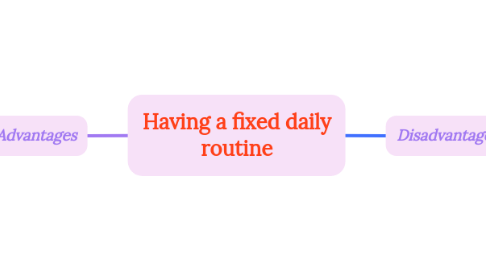
1. Advantages
1.1. Improved Time Management
1.1.1. A fixed routine allows for better allocation of time for work, rest, and personal activities. This can help in staying organized and minimizing wasted time.
1.2. Increased Productivity
1.2.1. Having set routines can help establish a flow, reducing decision fatigue and making it easier to focus on tasks without distractions.
1.3. Consistency and Stability
1.3.1. A fixed schedule can create a sense of order and stability, which can be particularly beneficial for mental well-being. It offers predictability and reduces stress related to uncertainty.
1.4. Better Habits
1.4.1. Routines help in building and maintaining positive habits, such as exercise, healthy eating, or dedicated study time. Repetition fosters consistency, which can lead to long-term improvements in health, performance, and overall success.
2. Disadvantages
2.1. Lack of Flexibility
2.1.1. A rigid routine may leave little room for spontaneous activities or adjustments. This can be frustrating if unexpected events or opportunities arise that don't fit into the schedule.
2.2. Monotony and Boredom
2.2.1. Doing the same activities at the same times every day can lead to boredom. Without variety or change, it may feel like life is on "autopilot," which can reduce motivation and enjoyment.
2.3. Inability to Adapt to Changes
2.3.1. A fixed routine can make it difficult to adapt to changes in circumstances, such as a new job, family situation, or external challenges. This lack of adaptability can cause stress.
